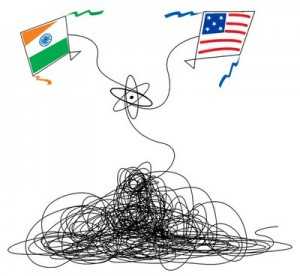The question everyone seems to be asking is when would we reach a stage when the U.S. India relationship would begin afresh? But then again, with a gallant promise made by Prime Minister Modi to open the economy to more private investment than ever, in the process improve the GDP growth rate, create jobs for the deservedly young India and hasten the process of India’s defense modernization, this is probably the right time for relationship between U.S. and India to witness a surge.
 If Modi realizes his vision, it will not just open up countless doors for a healthy India-U.S. co operation on numerous issues, but it will also bring New Delhi and Washington on a similar platform where in they will share similar objectives involving countering terrorism, promoting open and free seaway trade through the Indo-Pacific region among other issues.
If Modi realizes his vision, it will not just open up countless doors for a healthy India-U.S. co operation on numerous issues, but it will also bring New Delhi and Washington on a similar platform where in they will share similar objectives involving countering terrorism, promoting open and free seaway trade through the Indo-Pacific region among other issues.
It was during his recent visit to India that U.S. Secretary of State John Kerry made it explicitly clear that when Modi visits US in September, he is all set to receive a thunderous reception. The joint statement which was issued after the fifth round of the strategic dialogue talks talk about an expansive and elaborate agenda which will take the relationship between the two countries to another level.
Some of the agendas which were discussed include agendas like before the year ends, they are committed to hold a meeting of the Counter-Terrorism Joint Working Group, ministerial-level Homeland Security and Trade Policy Forum dialogues, the CEO’s Forum, as well as the next round of the High Technology Cooperation Group. The U.S. also will participate for the first time in India’s Annual Technology Summit in November. This as is evident is a sign of changing times but then practically speaking, it is all about keeping pace with times and not letting go the momentum for transformations to take place.
Then again the WTO incident sticks out like a sore thumb. Although India’s position would have been disappointing given the situation, the step it took eventually was extremely disturbing coming from the government which has been going to great lengths to project the country as a dynamic economy encouraging global trade and investment.
Moving forward, the BJP government will need to show it is genuinely committed to bolstering the private sector and demonstrating leadership in the global trade arena. Modi’s track record of making Gujarat one of India’s most investor friendly states gives confidence that he will prioritize reviving the economy and encouraging private-sector growth.
Although changes are not going to happen overnight, the signs are there. The commitment to a pro-business agenda sure sounds promising.
From the Defense Perspective
 One area where the relationship is all set to turn a new leaf is the defense sector. As the BJP’s election manifesto spoke about the need to modernize India’s armed forces and to galvanize the defense purchases and promise has been kept as the government in one progressive turnaround, raised the foreign direct investment cap in the defense sector to 49 percent. And not just that, the defense spending in the budget has been raised to 12%. This will definitely motivate U.S. to invest in India and will in turn help them develop India’s defense industrial base.
One area where the relationship is all set to turn a new leaf is the defense sector. As the BJP’s election manifesto spoke about the need to modernize India’s armed forces and to galvanize the defense purchases and promise has been kept as the government in one progressive turnaround, raised the foreign direct investment cap in the defense sector to 49 percent. And not just that, the defense spending in the budget has been raised to 12%. This will definitely motivate U.S. to invest in India and will in turn help them develop India’s defense industrial base.
U.S. Defense Secretary Chuck Hagel during his recent visit to India spoke about dozens of proposals which India can definitely think about with regard to co-production of defense items and transfer of technology. Co-producing the Javelin anti-tank missile is one of the most important proposals which India can give a serious thought to. Over the last decade, U.S. has cumulatively signed nearly $13 billion in defense contracts and that includes top line deals of military transport aircraft and helicopters. But then the setbacks have neutralized the effect somehow. When India decided to down select two U.S. companies from a bidding process to fill its requirement for 126 fighter aircrafts, it was quite a difficult pill to swallow for U.S. On the flipside, U.S. has been trying for years to convince India to sign U.S. defense technology agreements so that they can export the best of their technology. But India’s reluctance is not doing any favors to the whole process.
Clarity over Nuclear Deal
 Over the past half decade, the nuclear issue has been a cause of concern between India and U.S. When the BJP was the opposition party, it vehemently opposed the nuclear deal and pushed for liability legislation that complicated matters further. Now with the BJP in power, the U.S. must kick start the attempt to resolve the issue if it has to invest in India’s civil nuclear sector. U.S. must also insist on India’s membership in the major multilateral nonproliferation groupings, such as the Nuclear Suppliers Group and the Missile Technology Control Regime. The BJP’s coming into power is all set to re energize U.S. India ties and progress on the areas of defense, security, trade and counter terrorism co operation.
Over the past half decade, the nuclear issue has been a cause of concern between India and U.S. When the BJP was the opposition party, it vehemently opposed the nuclear deal and pushed for liability legislation that complicated matters further. Now with the BJP in power, the U.S. must kick start the attempt to resolve the issue if it has to invest in India’s civil nuclear sector. U.S. must also insist on India’s membership in the major multilateral nonproliferation groupings, such as the Nuclear Suppliers Group and the Missile Technology Control Regime. The BJP’s coming into power is all set to re energize U.S. India ties and progress on the areas of defense, security, trade and counter terrorism co operation.
The U.S. India relationship is on the brink of a fabulous new turn and progress is a foregone conclusion. It is just a matter of keeping up with the changing times. That is because more than the quantity, it is the quality of the Indo-U.S. dialogues which will make the ultimate difference and both the countries should look forward to cementing their relationship in a concrete manner while managing the day to day issues which are bound to come up at times.
